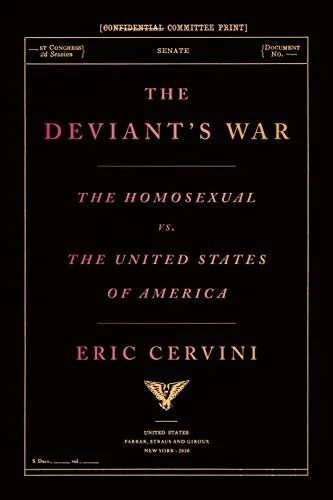The Deviant's War by Eric Cervini
/The Deviant’s War: The Homosexual vs. The United States of America
By Eric Cervini
Farrar, Straus and Giroux, 2020
At one point in his academic research into the Mattachine Society of Washington and its founder Frank Kameny, author Eric Cervini made a decision for which his readers will be very grateful. “After completing my thesis, I decided I couldn’t abandon the story,” he writes in The Deviant’s War: The Homosexual vs. the United States of America. “Frank Kameny deserved a book.”
Kameny was an astronomer in the employ of the US Department of Defense in 1957 when he was fired for being homosexual. He took his pain and resentment over this humiliation and transmuted it into advocacy. Long before the Stonewall riots of 1969, Frank Kameny was helping to lay the groundwork for some fundamental societal changes; as Cervini notes about his initial examination of the man and his work, “I quickly realized that I was staring at the hidden history of the American gay rights movement.”
Cervini has consulted a vast trove of documentation for that hidden history, and in these pages he tells the story of both the man and the movement in prose at once so assured and so gripping that readers will have a hard time remembering this is the author’s debut. And whenever possible, he tries to let his many characters speak for themselves; in letters, journals, interviews, and public testimony, readers hear directly from both the oppressors and the oppressed, most especially Kameny himself, always sharply intelligent, often ready with lines that are both poignant and quotable, as when he was interrogated at a House District subcommittee meeting in the 1960s, defending the Mattachine Society - and the simple humanity of gay people throughout the country:
What about a homosexual cure? Interjected Congressman B. F. Sisk of California.
“We certainly would not oppose it,” said Kameny. But homosexuals are not sick, and the Society does not concern itself with a cure. “The NAACP does not try to see what can be done about bleaching the Negro.”
“You do not condone the homosexual act, do you not?” asked Congressman Horton.
“We feel that it should not be made criminal.”
“You do condone the homosexual act, do you not?”
“My statement stands. We feel that it should not be a matter of criminal law.”
The Deviant’s War contains countless scenes like this, moments of raw drama served up with a minimum of stage-dressing and a quiet discernment of what’s important to stress and what’s not. Frank Kameny could scarcely have wished for a better, more heartfelt biography, but there’s a great deal more than this going on in the book. This is an incredibly valuable contribution to the history of gay rights in America.
—Steve Donoghue is a founding editor of Open Letters Monthly. His book criticism has appeared in The Boston Globe, The Wall Street Journal, The Washington Post, and The American Conservative. He writes regularly for The National, The Vineyard Gazette, and The Christian Science Monitor. His website is http://www.stevedonoghue.com.
